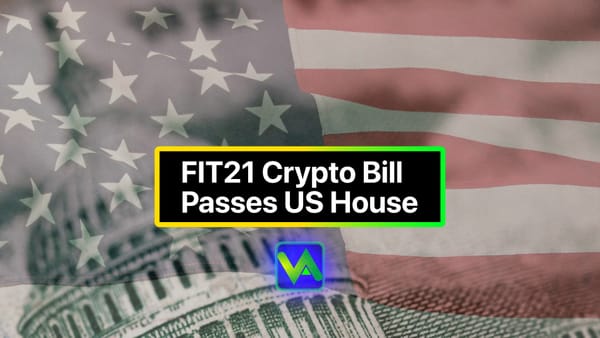
FIT21 Act Clears US House With Bipartisan Support, Redefines Crypto Rules
The United States House of Representatives has passed the Financial Innovation and Technology for the 21st Century Act (FIT21), a comprehensive bill aimed at regulating the cryptocurrency and blockchain industry. The legislation, which received bipartisan support, sets clear legislative boundaries for virtual assets and establishes regulatory requirements for entities operating in the crypto space.
Background on the FIT21 Act
The FIT21 Act, introduced by House Financial Services Committee Chairman Patrick McHenry (R-NC), seeks to provide clarity and structure to the largely unregulated cryptocurrency market in the US. The bill aims to establish a clear division of regulatory responsibilities between the Securities and Exchange Commission (SEC) and the Commodity Futures Trading Commission (CFTC) concerning digital assets.
Under the proposed legislation, the CFTC would gain new jurisdiction over "digital commodities," such as Bitcoin, while the SEC would maintain its authority over virtual assets offered as part of an investment contract. Additionally, FIT21 would create a process for permitting the secondary market trading of digital commodities initially offered as investment contracts.
Key Provisions and Industry Impact
The FIT21 Act includes several provisions designed to protect consumers and strengthen the cryptocurrency market:
-
Disclosure Requirements: Digital asset developers would be required to provide accurate and relevant disclosures, including information about the project's operation, ownership, and structure.
-
Customer Protection: Exchanges, brokers, and dealers dealing with digital assets would need to provide appropriate disclosures to customers, segregate customer funds from their own, and adhere to registration, disclosure, and operational requirements to reduce conflicts of interest.
-
Regulatory Clarity: The bill establishes clear boundaries between the SEC and CFTC's jurisdictions, creating comprehensive registration regimes for entities serving customers in digital asset markets.
The passage of FIT21 could legitimize cryptocurrency enterprises and attract more traditional investors, potentially leading to broader adoption. By creating a level playing field and enforcing anti-money laundering (AML) and counter-terrorism financing (CTF) regulations, the bill may encourage innovation and competition while addressing public concerns about cryptocurrencies.
However, some critics argue that the legislation might still leave certain regulatory gaps and ambiguities. There are also concerns about the effective collaboration between the SEC and CFTC in enforcing the new rules.
Reactions and Political Landscape
Industry leaders have welcomed the FIT21 Act, seeing it as a crucial step towards achieving regulatory clarity and ensuring the sustainable growth of the cryptocurrency ecosystem. Coinbase CEO Brian Armstrong called the House vote a "historic step" that will "finally start to create some clear rules to regulate crypto". Ripple CEO Brad Garlinghouse and Cardano founder Charles Hoskinson also celebrated the bill's approval.
Despite the bipartisan support in the House, the bill's prospects in the Senate remain uncertain. The lack of a companion bill and potential opposition from prominent crypto critics like Senator Elizabeth Warren (D-MA) could hinder its progress. If the Senate approves FIT21 with amendments, both chambers would need to reconcile any differences before a final vote.
President Joe Biden has expressed opposition to the bill, citing concerns over inadequate investor protections, but importantly, has not threatened a veto. The White House's stance and the evolving political landscape surrounding cryptocurrencies will play a crucial role in determining the ultimate fate of the FIT21 Act.
Former President Donald Trump has also recently weighed in on the crypto debate. At a recent event for holders of Trump Digital Trading Cards (an NFT collection), Trump stated that he is "fine with" crypto and wants to "make sure it's good and solid."
He said "if you're in favor of crypto, you'd better vote for Trump."
Trump's comments underscore the growing influence of cryptocurrencies in the political arena and the need for a comprehensive regulatory framework to address the challenges and opportunities they present.
** Related: Crypto Takes Center Stage in US Election **
Global Regulatory Landscape and Challenges
The passage of FIT21 in the House comes amidst a global effort to regulate cryptocurrencies and blockchain technology. Regulators worldwide are grappling with the challenges of balancing innovation and consumer protection in this rapidly evolving industry.
Resource-constrained authorities, particularly in emerging economies, face difficulties in monitoring and responding to risks generated by crypto markets. The uneven growth of these markets across the world and the varying capacities of regulators to address the associated risks highlight the need for international cooperation and support.
The International Monetary Fund (IMF) has been working with countries to help them navigate the changing landscape of crypto assets. The IMF emphasizes the importance of establishing and effectively implementing regulation and supervision as a foundation for better data collection, effective capital flow measures, and fiscal and tax policies.
Fit21's Future and the Crypto Industry
The passage of the FIT21 Act in the U.S. House of Representatives represents a move towards establishing a comprehensive regulatory framework for cryptocurrencies and blockchain technology in the United States. While the bill aims to provide clarity, protect consumers, and encourage innovation, its ultimate impact will depend on its journey through the Senate and the potential challenges it may face along the way.
As the global regulatory landscape continues to evolve, international cooperation and support will be crucial in addressing the unique risks and opportunities presented by the cryptocurrency industry. The ongoing debate surrounding the FIT21 Act underscores the importance of striking a balance between fostering innovation and ensuring the stability and integrity of financial markets in the digital age.